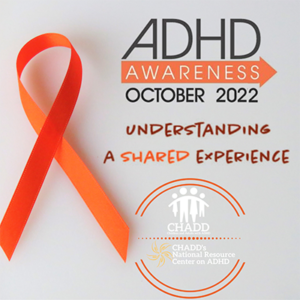There is a saying: If you know one person with ADHD, then you know one person with ADHD. It means that everyone’s experience with ADHD, its symptoms, and its effect on someone’s life is different. It’s also true that there are many common and shared experiences among the those who have ADHD that help to define us as a community.
This year, ADHD Awareness Month will highlight the shared experiences of children, adults, and families who have ADHD. The month-long video series “A Shared Experience” features experts in the fields of ADHD treatment, research, and family life sharing their knowledge on diagnosis, treatment, and lifestyle.
“ADHD awareness continues to grow around the world, but there’s still a huge lack of understanding, a lot of misconception about what ADHD is and what it isn’t,” says Roxanne Fouché, director of the ADHD Awareness Month Coalition. “When you think about ADHD, it takes this huge toll on people’s mental health, on their general well-being, on communication and relationships, on their social and family lives. The more that we can get the word out of what ADHD is, the more people can be assisted and helped, and it’s good for everybody.”
A shared experience
The ADHD coalition, comprised of CHADD, the ADHD Coaches Organization (ACO), and the Attention Deficit Disorder Association (ADDA), working alongside ADHD Europe, is sharing videos featuring leading ADHD experts and ADHD community members who have submitted their own video content. Videos will be shared throughout October on social media and on the ADHD Awareness Month website.
Among the featured experts is CHADD professional advisory board member Margaret H. Sibley, PhD. Celebrating our shared experiences and supporting one another with evidence-based information, she says, is an important part of ADHD awareness.
“I think it’s really important for the general public to empower themselves to verify things that they’re learning online because a lot of times these stories are relatable,” Dr. Sibley says. “They are being shared by people who truly have ADHD, but sometimes if you’re not a professional, it’s hard to tease out the parts of your life that are due to ADHD versus other things that you have going on.”
“Every year, we spend October highlighting the experiences of people with ADHD, celebrating the unique stories and perspectives of the ADHD community, and educating the public about ADHD by fighting misinformation and lifting up real facts,” says Patricia Hudak, president of CHADD’s board of directors.
Also taking part in the video series are Ari Tuckman, PsyD, MBA, a clinical psychologist and co-chair of the planning committee for the 2022 Annual Conference on ADHD, Thomas E. Brown, PhD, a leading researcher and author on ADHD, and J. Faye Dixon, PhD, a clinical professor of psychiatry and behavioral sciences at UC MIND Institute who works directly with children who have ADHD and their families.
“We are very glad to have these outstanding speakers joining us this year,” says Ms. Fouché.
ADHD on TikTok
For this year’s series the ADHD Awareness Coalition ventured into the newer social media platform of TikTok. Many ADHD influencers have found a place on TikTok, along with teen and young adult members of the ADHD community. The coalition has been buildings its social media presence since the early days of Facebook. Since the ADHD community has found a place on TikTok, along with Twitter and Instagram, the ADHD Awareness Coalition is eager to join the community.
“No two people with ADHD are alike,” says Ms. Fouché. “That’s why we are encouraging our community members on TikTok and on more established social media to share their experiences with ADHD in video form. In addition to viewers’ videos sharing their ADHD experiences, we will post the short videos with ADHD experts talking about the commonalities that they see in people’s experiences on our TikTok page.”
You can learn more about this year’s video submissions at Express Yourself: Your Art, Stories, Memes, and Videos.
CHADD is the trusted source of information
CHADD has been raising awareness about ADHD since its beginning in 1987. Since then, through it many local chapters, award-winning Attention magazine, the National Resource Center on ADHD and the annual international conference on ADHD, it has expanded the ways it can bring information and support to the ADHD community.
“We have the evidence-based information for ADHD,” says Patricia Hudak, president of CHADD’s board of directors. “It’s reliable, it’s credible. The ADHD professionals involved with CHADD are the best of the best in the world of ADHD. As home to the CDC-funded National Resource Center on ADHD, CHADD has the experts to review the science and provide easy-to-understand descriptions for parents, adults, teachers, and other caregivers. CHADD’s National Resource Center provides information to the ADHD community through written resources, videos and podcasts. Its health information specialist team answer and return phones calls from community members seeking more information or a place to start when newly diagnosed with ADHD.”
Help raise awareness:
- CHADD’s ADHD Awareness
- ADHD Awareness Month
- About ADHD
- October Is ADHD Awareness Month: Why That’s Important
- ADHD? I Don’t Believe in It!
- Advice on ADHD Advice
- CHADD Highlights the Most Common Children’s Mental Health Condition for Mental Health Awareness Month
- Toppling the Myths of ADHD
- The Myth of ADHD Overdiagnosis
- ADHD and Criminal Justice, Part Two: Raising ADHD Awareness in the Local Community
Join the discussion: How are you helping to raise ADHD awareness?


